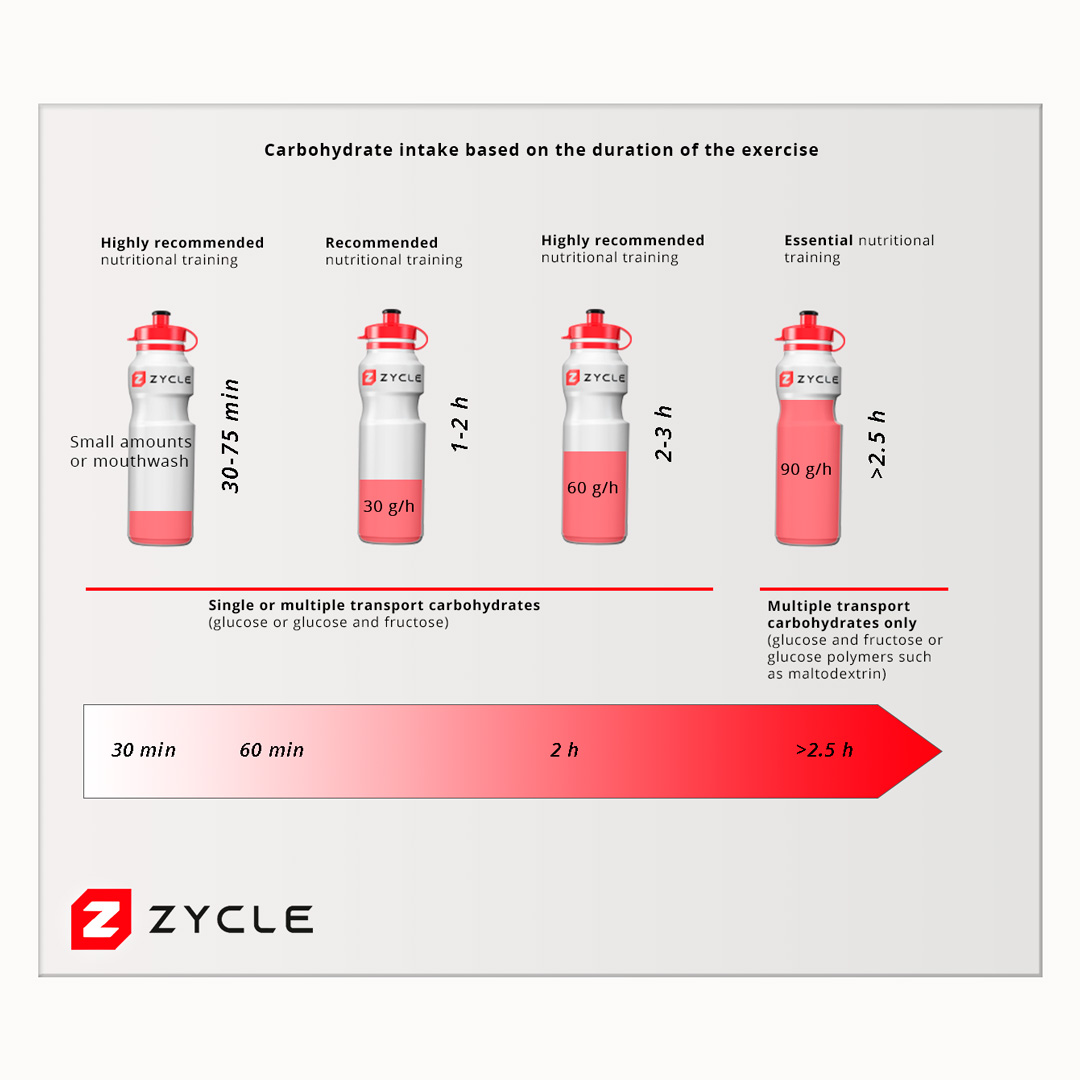Carbohydrates. The energy for your training
In recent years, considerable progress has been made in the role that carbohydrates play during sports. This allows more individualised and specific advice on the intake of this nutrient type during training and, especially, in competition.
The proposed new guidelines take into account the duration (and intensity) of the exercise, recommending the amount as well as the type of carbohydrates to consume to positively influence performance.
The recommended consumption of carbohydrates can be obtained from drinks, gels or solid foods (bars). Choosing one or the other will depend on your preference and which feels better.
Carbohydrate intake during exercise and performance
Although the exact mechanisms are not fully understood, research has indicated for a log time that consuming foods rich in carbohydrates during exercise can increase and improve performance.
Long-duration exercises
In sports sessions over two hours, carbohydrate intake prevents hypoglycaemia, maintains high levels of carbohydrate oxidation and increases resistance capacity.
20 g/h of carbohydrates is sufficient to obtain performance benefits during long sports sessions.
Short duration exercises
Although in high intensity and shorter duration exercises, for example one hour around 75% of VO2max, carbohydrate intake can also improve performance. Although in this case, the process that causes these improvements is different.
From what has been observed, when administering glucose to the bloodstream, it is absorbed at high levels, although this increase in glucose, as food for the muscles, has no effect on performance.
On the other hand, when the athlete gargles a carbohydrate solution, his/her performance improves, and this increase is the same as when ingesting it. Different studies carried out point towards the same results.
This suggests that the positive effects of carbohydrate consumption during sports are not limited to the metabolic process, but may also contribute to improved motor response. These effects are limited to carbohydrates, regardless of taste.
Carbohydrate intake based on the duration of the exercise
The usual guidelines marked the limit at 60 g/h, understanding that it cannot oxidise beyond 1 g/min., although this seems not to be the case and the amounts may be greater.
Research indicates that the weight of the athlete is not an influence, since the limiting factor in absorption is independent of body mass. Therefore, absolute values in carbohydrate consumption are recommended according to the duration:
 These values are recommended for high level athletes. They must be adjusted downward for amateur athletes.
These values are recommended for high level athletes. They must be adjusted downward for amateur athletes.
| Duration | Amount | CH Type | Training |
|---|---|---|---|
| 30-75 minutes | Small amounts or mouthwash | Single or multiple transport carbohydrates (glucose or glucose and fructose) | Highly recommended nutritional training |
| 1-2 hours | 30 g/h | Single or multiple transport carbohydrates (glucose or glucose and fructose) | Recommended nutritional training |
| 2-3 hours | 60 g/h | Single or multiple transport carbohydrates (glucose or glucose and fructose) | Highly recommended nutritional training |
| >2.5 hours | 90 g/h | Multiple transport carbohydrates only (glucose and fructose or glucose polymers such as maltodextrin) | Essential nutritional training |
Type of carbohydrates consumed and performance
According to several studies, not only the amount, but also the type of carbohydrate consumed influences performance and delays fatigue.
Mixing glucose with fructose, at a 2:1 ratio, seems to be the most effective. Obtaining greater improvements than if opting for a single type of carbohydrate.
Study on cyclists on an ergometric bicycle.
2 h. at 54% VO2 max. plus timed test of approximately one hour.
Glucose drink >> Increase power by +9%
Glucose/fructose >> Increase power by +17%
The benefits were generally observed in studies of more than 2.5 hours, being more visible during hour 3.
Training carbohydrate intake
The absorption of large amounts of carbohydrates requires training. So it must be introduced into the training routine so that the stomach can adapt to it.
Failure to do so is more than likely to make you feel bad if these amounts are eaten in competition, and will obtain no benefit.